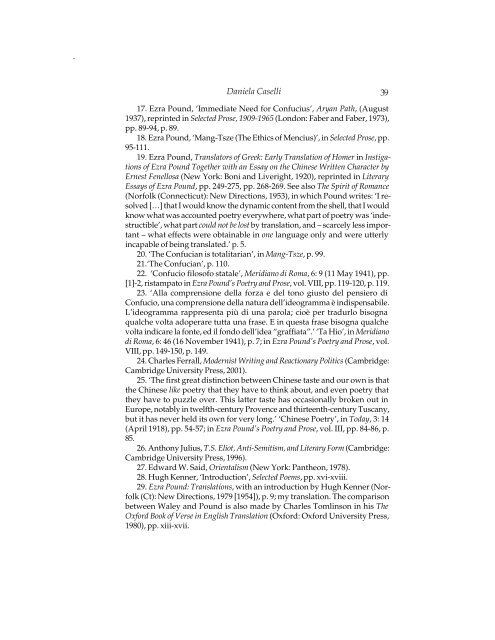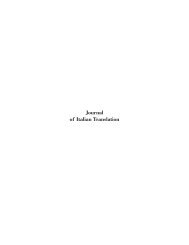Journal of Italian Translation
Journal of Italian Translation
Journal of Italian Translation
You also want an ePaper? Increase the reach of your titles
YUMPU automatically turns print PDFs into web optimized ePapers that Google loves.
Daniela Caselli<br />
17. Ezra Pound, ‘Immediate Need for Confucius’, Aryan Path, (August<br />
1937), reprinted in Selected Prose, 1909-1965 (London: Faber and Faber, 1973),<br />
pp. 89-94, p. 89.<br />
18. Ezra Pound, ‘Mang-Tsze (The Ethics <strong>of</strong> Mencius)’, in Selected Prose, pp.<br />
95-111.<br />
19. Ezra Pound, Translators <strong>of</strong> Greek: Early <strong>Translation</strong> <strong>of</strong> Homer in Instigations<br />
<strong>of</strong> Ezra Pound Together with an Essay on the Chinese Written Character by<br />
Ernest Fenellosa (New York: Boni and Liveright, 1920), reprinted in Literary<br />
Essays <strong>of</strong> Ezra Pound, pp. 249-275, pp. 268-269. See also The Spirit <strong>of</strong> Romance<br />
(Norfolk (Connecticut): New Directions, 1953), in which Pound writes: ‘I resolved<br />
[…] that I would know the dynamic content from the shell, that I would<br />
know what was accounted poetry everywhere, what part <strong>of</strong> poetry was ‘indestructible’,<br />
what part could not be lost by translation, and – scarcely less important<br />
– what effects were obtainable in one language only and were utterly<br />
incapable <strong>of</strong> being translated.’ p. 5.<br />
20. ‘The Confucian is totalitarian’, in Mang-Tsze, p. 99.<br />
21.‘The Confucian’, p. 110.<br />
22. ‘Confucio filos<strong>of</strong>o statale’, Meridiano di Roma, 6: 9 (11 May 1941), pp.<br />
[1]-2, ristampato in Ezra Pound’s Poetry and Prose, vol. VIII, pp. 119-120, p. 119.<br />
23. ‘Alla comprensione della forza e del tono giusto del pensiero di<br />
Confucio, una comprensione della natura dell’ideogramma è indispensabile.<br />
L’ideogramma rappresenta più di una parola; cioè per tradurlo bisogna<br />
qualche volta adoperare tutta una frase. E in questa frase bisogna qualche<br />
volta indicare la fonte, ed il fondo dell’idea “graffiata”.’ ‘Ta Hio’, in Meridiano<br />
di Roma, 6: 46 (16 November 1941), p. 7; in Ezra Pound’s Poetry and Prose, vol.<br />
VIII, pp. 149-150, p. 149.<br />
24. Charles Ferrall, Modernist Writing and Reactionary Politics (Cambridge:<br />
Cambridge University Press, 2001).<br />
25. ‘The first great distinction between Chinese taste and our own is that<br />
the Chinese like poetry that they have to think about, and even poetry that<br />
they have to puzzle over. This latter taste has occasionally broken out in<br />
Europe, notably in twelfth-century Provence and thirteenth-century Tuscany,<br />
but it has never held its own for very long.’ ‘Chinese Poetry’, in Today, 3: 14<br />
(April 1918), pp. 54-57; in Ezra Pound’s Poetry and Prose, vol. III, pp. 84-86, p.<br />
85.<br />
26. Anthony Julius, T.S. Eliot, Anti-Semitism, and Literary Form (Cambridge:<br />
Cambridge University Press, 1996).<br />
27. Edward W. Said, Orientalism (New York: Pantheon, 1978).<br />
28. Hugh Kenner, ‘Introduction’, Selected Poems, pp. xvi-xviii.<br />
29. Ezra Pound: <strong>Translation</strong>s, with an introduction by Hugh Kenner (Norfolk<br />
(Ct): New Directions, 1979 [1954]), p. 9; my translation. The comparison<br />
between Waley and Pound is also made by Charles Tomlinson in his The<br />
Oxford Book <strong>of</strong> Verse in English <strong>Translation</strong> (Oxford: Oxford University Press,<br />
1980), pp. xiii-xvii.<br />
39

















